News and views from our community
-
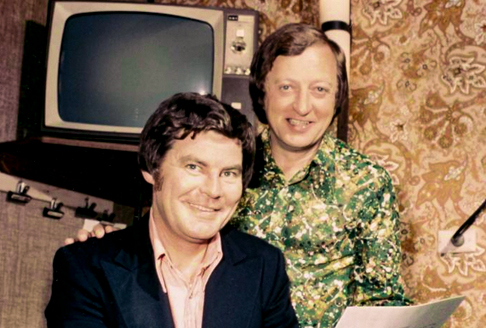
Meet TV writer Mike McColl Jones
Humble and quietly-spoken, it’s no surprise that Michael McColl Jones shocked TV executives years ago by building a quick rapport with the infamously prickly Graham Kennedy. A fan of cocktail frankfurts, James Patterson crime novels, soft liquorice and a good trashy magazine, just don’t put Mike near a stage or microphone!Mike, can we start with the irony of you hating the very thing that you spent your entire professional life supporting – live performance!I loathe public speaking! I don’t seek publicity at all. I’m very happy to stay behind the scenes.Graham (Kennedy) knew how terrified I was of public speaking and often used to joke that he never had to worry that I’d take over his job! Bert Newton used to say that I had ‘microphonobia”.But your speech at Graham Kennedy’s funeral where you read a Fax from Heaven that you said Graham had sent to you that morning was so brilliantly delivered. How did you manage this? I was so scared that I drove for over eight hours from Melbourne to Bowral, NSW for the funeral rather than flying so that I could commit the speech to memory.But I’ll tell you why I said yes to speaking at Graham’s funeral. There was no-one from Melbourne on his funeral bill who could speak live. Graham was Melbourne-born and he conquered everything from Melbourne. I felt it was very important that someone from Melbourne spoke at his funeral. And you even got everyone singing at the end of your speech?Yes! I didn’t know that I was going to be leading them all into the song until Geoff Harvey told me 20 minutes before the show that I needed to sing.I was petrified! There I was doing something that I hated even more than public speaking – singing!Can you imagine Graham laughing from heaven at your expense?Absolutely!You are renowned for your comedy writing, even awarded an OAM in 2017 for services to the arts and TV. But your entry into the world of TV writing was a story in itself.You started out as a travelling door salesman while also contributing material to Channel 9 on the side. You eventually got your break with a one-month trial working with Graham Kennedy. How was this month? Terrifying! For a start, I didn’t know if I would actually get the gig or not and I was starting from scratch. I was lucky to have met Fred Parsons who became my mentor. To my mind, the greatest comic writer this country has ever seen because he was a writer for vaudeville and theatre and a top writer for radio and TV in their golden days.Your relationship with Graham was unusually positive. Why do you think you got on so well?Before I started, Graham didn’t have a great relationship with writers because they tried to get away with murder – not all of them, but a lot of them.During my one-month trial, I sent Graham some material and then got a note back from him with feedback. It was pretty unheard of for Graham to write notes to writers and not long after that, I was given the permanent gig. I ended up writing for him for over twenty years.I didn’t treat Graham differently to other people. We had the same attitude to comedy that was basically get a laugh and if we got into trouble with the sponsors along the way, well, so be it.We upset all sorts of people but we also knew our boundaries.You always wanted to be a writer. Why? Yes, I always wanted to be a writer but I didn’t know of what.I wasn’t the classic prolific reader and writer as a child and I really don’t know why I wanted to be a professional writer. I just liked it.I think there’s a bit of rebel in all of us – certainly there is in me. I enjoyed pricking pomposity and big business through words.Probably the most rewarding thing was being able to do something under the cloak of anonymity – no one knew where the jokes and content was coming from and I loved it that way.What are some of the best memories of your TV writing career? (I’ve heard you say that you try only to remember good things, so I won’t ask you about your bad memories).I worked with Graham for over 20 great years.I introduced a few things into his shows that remained for the full life of the show.For example, I introduced a segment ‘Headlines of the future’ that ran every Wednesday for 10 years.Graham would have a mocked-up paper and it was headlines you may read in the paper 30 years hence.I remember the first joke I did for this segment:Today Elizabeth Taylor celebrated her golden wedding anniversary – 50 husbands!With your vast experience in writing and dealing with people – what have you learnt?The thing you learn is that everyone is the same – everyone has fears and gets cranky. People are nothing out of the ordinary just because they’re famous.Did anything surprise you looking back now at your career? I think the thing that surprised me most of all is that it’s all over in a moment. You can worry about something for days but when you’ve completed a show – or delivered a speech – it’s over and in the ether. There’s no time to say I’ll do it again - you don’t have that opportunity – it’s hit or miss.After being in TV industry for so long, what advice would you give your younger self?My advice is that once you’ve created something and had it published or performed, don’t worry about it. There’s no point in worrying about something once it’s done – it’s out there and finished. Let it go.I generally try not to hurt people but at times you do, and at times you can do this intentionally because you don’t like them necessarily! But I try not to hurt anyone because I think comedy should be a place where we do laugh and have some fun. More importantly, we should laugh at ourselves. That’s the best sort of humour.You also need to be able to work really hard and be committed.When I worked as TV writer for Graham and others I was in the studio from 9.15a.m. to two or three a.m. the next day for five days a week for over 20 years.It’s a job and I did it to the best of my ability.I did 25 Logies and two Royal Command performances for the Queen and Charles and Di. They were big shows – huge pressure events.Who makes you laugh?Bert and Graham made me laugh. But people don’t have to be comedians to make me laugh. Friends who would be known to no-one make me laugh.I’ve retained friendships with lots of people. For 50 years, I met all the top people in the world. For 50 years! That’s throwing in people like Americans Shelley Berman and Bob Newhart.If there was a TV series made about you, what would it be called?Mr NervousAre you a nervous person?Yes, particularly if I get close to a stage or a microphone! Bert used to say that I had microphonophobia.But being a writer, you can be behind the scenes. That must have helped?Yes, well, you have to be! I was lucky enough to have a relationship with GK/Bert and Steve Vizard and they could almost tell what I was thinking before I said it/did it/wrote it down.One night during ‘Tonight Live’ I made Steve laugh so hard that he had to go to a commercial break because he couldn’t continue. It was just something I said off the top of my head and he just collapsed laughing – it had hit a nerve. I’d say it into his ear live – I’d just walk over and tell him something.Did you seek out accolades during your career?No! No! The worst thing that could happen to me would be to get singled out – I hated that.It was enough that the jokes worked on the night.There’s no way known that anyone could fool me into thinking that a bad show was a good show. We seldom had bad shows but on those rare occasions there’d be no drinks in GK’s dressing room.Are you a big reader?Yes, I read everything. I read all sorts of things from the local paper to magazines. I love the trashy magazines – I don’t believe a thing about them and they contradict themselves in the one story!I also like crime fiction and airline disaster books.My favourite crime writer is James Patterson. I bought his first book in New York and started reading it and thought he has worked out the formula for books and it’s a lot like a TV show –it’s all about pace. If you establish good pace early in a show or a book, you’ve got an audience hooked and nothing can stop you.You’re a published author of at least six books. Do you still write today?Yes. I do a weekly column for the Melbourne Observer and I’m also writing another book. This one is going to be the most interesting one of all.It’s unusual because I haven’t decided what the book is about yet – I keep changing my thoughts on it.My books have always been about other people but this book will be about me. It is likely to include some family history and some tips on how to write jokes.I write a little bit each day and it’s enjoyable because I have no idea how it’s going to turn out . Like many fiction writers who say they enjoy the process because they don’t know what their characters are going to do…well, I have no idea and I’m the character and I don’t know what I’m going to do (laughing).We’ll look forward to reading your book.So will I!Can we chat a bit now about your time at Hedley Sutton. What do you enjoy about life at Hedley?I’ve been at Hedley since the start of this year and everyone has been terrific.I don’t have any complaints. It’s the people who make it. You could have flashy marble everywhere in a place but it wouldn’t make any difference if the people were no good.I think the staffing is fantastic – there are some really, really good people – particularly a lot of younger people who are taking the trouble to find out things about how the place runs that impresses me. By and large for an organisation that’s so care oriented, it does a very good job.The other thing - and people can’t believe me when I say this – but the food here is amazing!What’s amazing about it?The variety, flavour and the way in which it’s served – it’s inventive and impressive.What they’d managed to do with food is that they take normal menu items and they play with them – put spices in them – make the food really interesting. The chef Elton has just got a dedication – Baptcare is so lucky to have someone like that.Our chef, Elton must have heard you talking! (Elton comes over to join the conversation and Mike gives Elton some live feedback).I think you should be very proud of what you do Elton. Congratulations. Your Japanese pancake on today’s lunch menu was fantastic! But one thing you shouldn’t ignore – with footy season around the corner – please include some cocktail frankfurts! They’ll be really popular, trust me.Do you get involved in the activities at Hedley?No, I don’t join in any of the activities at the moment because I tend to do my own thing, including working on my book. But I do eat dinner in the dining room and have made a few friends – some charming people who have made me feel very welcome.Any motto in life? Someone asked me recently what I would change in my life and I can say absolutely nothing.What’s done is done, and how am I going to change it? That’s me anyway. There’s nothing you can do about things that are done. It doesn’t worry me. Perhaps it should?What are you proudest of in your career?Making people laugh – it has been my forté for so many years and hopefully having people leave the studio/theatre in a better frame of mind than when they came in.Unfortunately, we’ve got to the stage in society now where you’ve got to be careful with anything you say. My attitude is don’t be careful with anything – just do it! I’d prefer to get a laugh rather than have someone snooze and nod off.There’s little danger of that happening in your company Mike. Thank you for your time. You can learn more about Baptcare Hedley Sutton community on our website:https://www.baptcare.org.au/services/aged-care-homes/residential-aged-care-homes/camberwell-residential-aged-care
- 20 Sep 2023
-
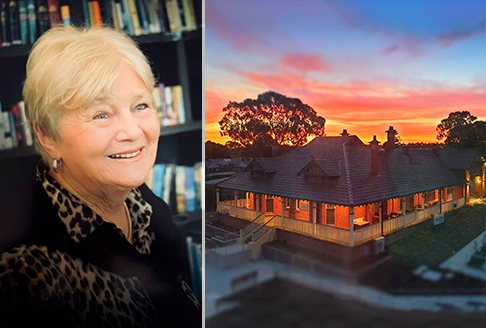
Meet Betty Logan, resident at Strathalan’s Retirement Living community
We were lucky to catch Betty for a chat given her busy schedule at Strathalan’s Retirement Living! But we’re glad we did. We’re pleased to share below Betty’s reflections of Strathalan, a shining example of someone who is retired and loving it.What do you enjoy about being in the Strathalan family? There are so many things that I enjoy such as the variety of options available at Strathalan, including the Hub lounges, library, gym, hairdresser, café and the homestead. Residents can choose whether or not to be involved in the many events, activities, interest groups and wellness programs on offer.I also like being with like-minded people who support each other and where many interesting discussions are enjoyed (particularly during the relaxed Happy Hour gatherings!).Another positive is the sense of being in a safe and secure community bubble as soon as one moves in. This is the case whether you move into an apartment or a villa (which I lived in while waiting for my great apartment, which I absolutely love).Since I moved here in December 2019, seven of my friends have also bought into Strathalan, surely proof that this is a special place to live! I know that I am where I am meant to be.What surprised you about living in a retirement living community? After moving into the apartments two years ago, I was pleasantly surprised by how quickly the residents not only developed strong neighbourly bonds but, for some, strong friendships too.It has been amazing discovering the unknown threads of connection that many residents have with each other before moving into Strathalan – for example, connections from school, friends, sport or areas where they lived pre-Strathalan.I’ve also been pleasantly surprised how much people care and support each other, too. Personally, I have been grateful for this support as my mobility is compromised due to recent surgeries.Can you tell us two surprising things about yourself? One - whilst staying with a politically well-connected American friend, my husband and I were presented to the Senate. We travelled in the “Senate Subway” in the tunnels underneath the Capitol (ed. the seat of the United States Congress, similar to Australia’s Parliament House, Canberra), finishing with a private tour of the Capitol (ed. where chief law makers make US law). It was such an amazing experience.Two - I was staying at Coolum Beach Resort on a three-day Team Building workshop for work. The theme of the day was ‘trust and integrity’ and we were asked to choose between going up a pamper pole or abseiling. I chose abseiling because I thought if I am going to do this workshop, then I was going to do the real thing! We were taken to the top of an escarpment in the Gympie area. At one stage, I found myself on the overhang rock where I hung like a bat. I did freeze for a bit but got myself together and completed the drop. Can we talk about the amazing photos you send us of the Strathalan homestead? Is photography a hobby of yours? Not really although I’ve always owned a camera from a young age and have always enjoyed taking photos. However, since the great cameras included in smart phones nowadays, I think we all enjoy capturing things that cheer our souls! Do you have a motto in life? I have a few mottos, really, but there is one that I have used for much of my life that probably sums me up best:“We are each of us angels with only one wing, and we can only fly by embracing one another.” (Luciano De Crescenzo)Thank you, Betty, for being such a vibrant part of our Strathalan flock! Find out more about Baptcare’s Strathalan retirement living community: https://strathalanliving.com.au/
- 12 Sep 2023
-

Gemma’s experience as a Foster Care Sibling
Meet 18-year-old Gemma, daughter of foster carers Bernadette and Jason. Gemma is a talented artist who hopes to do further study in Fine Arts and Industrial Design. She has surprised herself by loving the foster caring journey too.What was your first reaction to hearing that your family was going to foster children? Originally, I didn’t think that the fostering would really involve me. I was excited when I realised that I was going to be a part of it too.How have you found the fostering experience?I really love it! It has also been really good for our family. It seems that kids like coming to us too. One foster care child recently said that they enjoyed being around our family because we were lots of fun.Sometimes we encourage the child to plan the day. For example, recently one of our visitors planned a visit to an arcade and then dinner at his favourite restaurant. He really enjoyed it, and we learnt a little about his culture too.What do you enjoy about being in a fostering family?I enjoy getting to know the kids on a more personal level, looking after them and just hanging out with them doing stuff.The kids start to feel a bit like a sibling to me. I do get attached to them and it can be hard to see them go.And they can surprise you too. One child recently went shopping with us and went and bought chocolates as a gift for our family. I thought this was really touching.What have been some of the challenges? Probably the need to balance my life and personal space.I’m currently doing my VCE, so I need to balance the workload out. I’ve had to explain to some foster kids that I can’t hang out all the time, that I’ve got schoolwork to do as well. Some of them are really sweet and offer to help me.What are some of the good things?There’s lots of life lessons involved in fostering – both for the kids and for me!I’m conscious that I have a role to play in the fostering experience and some responsibilities too.I hope some kids see me as a role model, particularly the girls who visit.I find it unusual because I’m not used to being a role model – but it feels good.I know that the male foster kids look up to my younger brother as a sort of role model – a big brother of sorts. He pretends that he doesn’t like it, but I know he does.What did you expect it would be like and how did your expectations measure up to the actual experience?I didn’t really have any expectations. I was pretty relaxed about it all and didn’t overthink it. I thought of it as just gaining some more younger siblings for a while.What has surprised you about being in a foster carer family? I was surprised to get so attached and close to the foster kids. I didn’t expect this. But when you start to hang out with them you just naturally get close to them. It surprised me how much I genuinely wanted to get to know them.You realise some kids are doing it tough. Some kids have had multiple placements. It made me realise that we’re doing something good for them and this feels good. Now that I’ve been involved in a foster care family, I’ve realised that I want to keep fostering in my life in the future.What have you learnt about yourself from the fostering experience?I think that I’ve surprised Mum and Dad a lot by the way I’ve got involved in our foster caring. I’ve been a lot more open, empathetic and engaged with the kids than they expected.I feel like I’ve grown in confidence a lot more since being involved in foster caring too. The first time I talked with Jacqui (ed Jacqui Bance, Baptcare Recruitment and Retention Worker, Carers Vic pictured with Gemma) I was really nervous and a bit unsure. Now I’m not.What qualities do you think you need to cope well with being a foster sibling? You probably need to be empathetic, a good listener and just active. The kids like activities and it helps us all bond too.What have you gained from the experience personally?I’ve realised that I really like talking and listening to the kids who stay with our family. I’ve found that some kids struggle emotionally and don’t really know how to express themselves. But if you ask them questions and really listen, they do open up.Any advice for other families/foster siblings thinking of becoming foster carers?I would tell them to just have a go! I would suggest that they get really engaged with the children and get to know them on a personal level, as it really helps you to understand their behaviour.Any tips on how to connect with foster siblings?I would suggest lots of talking, listening and going out and about doing activities that the children are into. This really helps with the bonding.I recently did some art therapy with one of our foster kids. I asked her to draw things that she liked and she drew a picture of her biological family. It really touched a chord with me.Another child drew a picture of me and I promised them I would put it in my VCE folio and I did!Do you think foster caring is important in society?Definitely! There are lots of kids out there who don’t have the support and care that they need. Giving kids the opportunity to stay with people until they can go back to their families is really important.That’s what every kid wants – just to feel loved and appreciated.I feel so privileged growing up in a loving, safe environment.These kids deserve to feel what I feel – loved, appreciated and safe.If you’re interested in joining Gemma and her family as part of Baptcare’s foster care community, please call Jacqui and have a chat on 0409 591 895.
- 12 Sep 2023
-
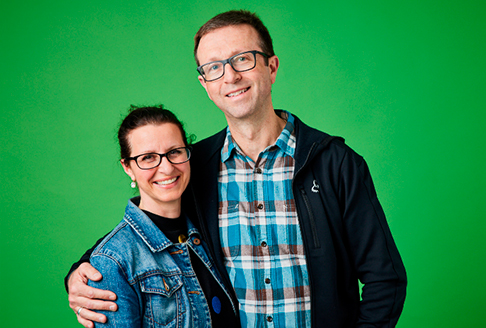
Meet Bernadette and Jason, foster carers with Baptcare
Meet Bernadette and Jason, foster carers with Baptcare. We sat down with them to find out about their fostering journey.How long have you been partnered with Baptcare?B: We’ve been providing foster care to children with Baptcare for over a year now.J: It was recommended that we start off with respite care as we’ve already got a daughter, Gemma, studying year 12 and a son, Sebastian in year 10, and two dogs.Why did you decide to become foster carers?B: I come from a big family with lots of extended family and lots of cousins.Part of this extended family group had been doing foster caring for a long time and showed me a photo of a baby they’d become fulltime carers for. I thought this was fantastic and it triggered me to make that initial call to Baptcare to become a foster carer. At that point I didn’t even tell Jason that I had applied.J: I thought it was great! I’d worked with people who had been foster carers and I was really open to the idea.But unlike Bernadette, my interest wasn’t a family-driven thing as I didn’t grow up with a large family. My thinking was more practically based. I thought that we had the spare space and ability to look after kids – to help people out and give back.I didn’t know there was a thing called respite care, but I’d worked with a guy who had been a carer and whose parents had fostered dozens of kids and thought the experience was awesome. I could see that he and his family had benefited from the experience and thought we might too.Any other motivators for becoming carers?J and B: One other motivator for becoming carers was to broaden our kids’ world a bit. Our kids are pretty spoilt – we wanted them to appreciate that there are many kids in the world who are less fortunate than them. Also, COVID was a big motivator. The kids had become a bit insular. We really wanted to broaden their world.How have your children reacted to the reality of having other kids bought into their space?B: We thought the kids would be jealous and defensive, but they’ve been great.Have you noticed that your kids have changed in behaviour?J: The kids were protective of their turf at the beginning but have learnt empathy now. We tried to explain to them that while it might be a bit disruptive for them having kids going into their home, imagine how much more difficult it was for the kids themselves having to enter a foreign environment with strangers.It has definitely made them more understanding.Sebastian has become so much more helpful and humble. He started off not letting any of the kids into his room but has changed to acting a bit like a big brother now.What has surprised you about being foster carers?B: We were prepared for the good, the bad and the ugly but it has been great.We’re sad that we can’t have more kids than we do presently but look forward to welcoming more children into our family as time goes on.We’ve recently had a lovely experience caring for a 10-year-old child who really became a part of the family.J: Being a carer has opened my eyes up. It has been a huge learning experience for me. I expected that kids were put in care because of bad parents but I’ve learnt that situations can be complicated.It is so much fun. Mind you, we’re like the fun grandparents. We go out of our way to make it a fun time for the visiting kids.What would you say to people contemplating becoming a foster carer?J: Just do it! It’s not hard.The process was long but easy. The hard part was actually making the decision to do it.If it wasn’t for Bernadette biting the bullet and actually applying, we may not have got around to doing it.You need to be prepared to change up your routine a bit and be flexible during the time you have the kids with you. For example, I’m a big bike rider so during the weekends that we have the kids, instead of going on my usual solo bike rides, I take them out for a ride too.But in general, daily life is the same, except you need to buy a bit more food.B: You do need to be organised as a family and clear your calendar for the time you have the visiting children. Also, you need to be on the same page as a family and have each other’s backs.What are some of the best and worst parts of your fostering experience so far?B: The best is how naturally we all adapted to having other people in our house.Also, it surprised me how attached I became to the visiting children.An incident I remember happening was when Jason and I had a disagreement regarding how to manage a child’s behaviour. This was pretty stressful. But we worked it out as a team. Just as with parenting, there are always going to be challenges in fostering. But we’re never alone. The caseworkers are always there to be called on for any guidance.J: It has been so great and personally rewarding too. Recently, the children we’d been looking after told us that they liked coming to our house. This felt good and made me think we’re ok people to be around.I’m not sure there is anything really bad. At times it can be difficult getting a visiting child to go to bed on time but nothing really hard or challenging.If you’re interested in joining Bernadette and Jason as part of Baptcare’s foster community, please call Jacqui and have a chat on 0409 591 895.
- 08 Sep 2023
-
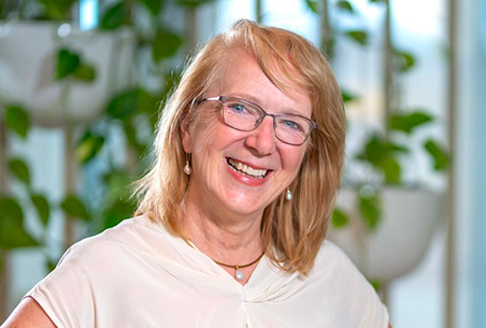
Geraldine Lannon celebrates one year at Baptcare
Our CEO, Geraldine Lannon, recently celebrated her one year work anniversary.Chair of the Baptcare Board, Tim Farren reflected on this milestone below.“As a Board we are thrilled that in her first year Geraldine has strengthened the leadership team within Baptcare, led important work to clarify where we can further improve our clinical practice and risk oversight in response to the increasing expectations of the community post Royal Commission, whilst also driving an even stronger opportunity within our Affordable Housing area.It has been wonderful also to see Geraldine so actively out and about amongst staff and all those in our community. Her presence and ability to listen to feedback from staff and clients has helped to strengthen and develop communication throughout Baptcare and beyond.The Board also acknowledges Geraldine’s ability to build important new networks within the Baptist communities across Australia, and with state and federal governments, whilst continuing to lead the mission and vision of Baptcare in the rapidly changing aged care and community services sector in which we all serve.Please join us all in celebrating Geraldine’s first year, and we look forward with her to provide fullness of life to people of all ages, cultures, beliefs, and circumstances.”
- 07 Sep 2023
-
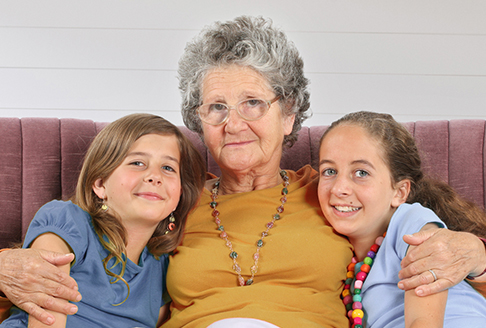
KINSHIP CARE WEEK | Meet carer, Gwen
Kinship Care week celebrates carers like Gwen.*Kinship carer to two granddaughters under 10 years old, Gwen has been a carer with Baptcare for two years. She sat down with us to discuss her journey as a kinship carer.Can you describe the role of a kinship carer?I struggled with becoming a parent again at the age of 50, having planned to do things that I wanted to do after raising my own children who are now in their 20s. But my life was turned upside down when I became a carer for my granddaughters.The main challenge was having kids in your care who you haven’t raised.You need to construct a plan to renavigate parenting boundaries and try and figure out quickly whether what you’re doing is right.Some days are hard and you question why you’re doing it but then you look at them and you know that you wouldn’t have it any other way.But it can definitely be isolating and daunting at times.You can’t go to a play group and meet parents the same age, as you’re a lot older.Another hurdle was coming to terms with the fact that I don’t have the support network that I had as a young parent of my own children.Are you in any Kinship groups?Kay (Kay Lewis, Family Services Practitioner at Baptcare) started coffee catch up time once a week with three other kinship carers and this is really great.How did Baptcare help?Kay and I wrote up a plan re the steps I needed to take.Kay referred me to the Government Grandparents hotline for advice re Centrelink. This hotline was not advertised and not easily accessible, but it has been such a support. I wouldn’t have known about it without Kay.How has Kay helped you?Kay has helped me so much but mostly just by being there and being very supportive.Kay is a family support worker and that’s exactly what she does – she supports me and my family. I’ve really appreciated her non-judgmental support.For example, if I am unsure how to approach my grandchildren’s behaviour, it has been great to be able to discuss things with Kay.When you only have you the cat and yourself around, sometimes you need this extra sounding board because the cat doesn’t have the answers!I had a low point lately with illness, and Kay checked in regularly. This meant a lot. Makes such a difference having somebody care about what’s happening in your life at that moment.How would you summarise your experience working with Baptcare?My experience with Baptcare has been nothing but positive.I’ve particularly appreciated their non-judgmental, emotional support but also the practical supports.For example, Kay found a donation service called Tassie Mums who make up ‘bundles’ of clothing, shoes and toys that are age/gender specific. My granddaughters arrived at my home without anything – no clothes or toys – so Tassie Mums really helped us out.A lot of the clothing in the box was new – there was even brand names! There were good clothes that we could use to take the girls out for special occasions. There was enough clothing in there for 12 months including winter and summer gear.Receiving the Tassie Mums box made me cry. It’s such a beautiful thing Tassie Mums do for people in the community.What would you say to people questioning whether to be kinship carers?Remember to get as much support as possible and to take time for yourself too.The decision whether to become a kinship carer is a very emotional time, so do your research and, if possible, get organised before you start caring.Any last words on Baptcare?Baptcare is a great organisation.I’m not a person who asks for help very often but Baptcare is really amazing with what they’re able to offer.*Names changed for privacy reasons.Learn more about Baptcare’s kinship care programs on our website.https://www.baptcare.org.au/services/foster-care/kinship-care-programsIf you’re interested in talking about your kinship care journey, call 0363236700 (Tasmania) or 03 9379 3800 (Victoria).
- 06 Sep 2023
-
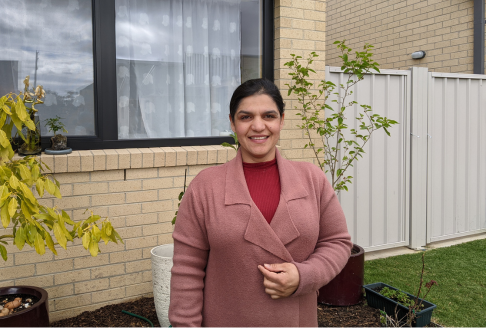
Huma finds a safe space in her Sunshine PassivHaus
Huma Nazukmir moved into her new Baptcare PassivHaus home with her family in May 2023.“I really like this house,” Huma says. “We were so happy to move in. It is close to the doctor, the train station, the bus stop.“My youngest child is five and his kindergarten is just down the street. There are lots of places for him to play.”Baptcare Affordable Housing’s development in Sunshine includes eight PassivHauses. This is the first PassivHaus-designed social/affordable housing in Australia.These dwellings meet international PassivHaus standards for airtightness, thermal insulation, ventilation, use of high-performance windows and doors and thermal bridge-free construction.“It feels a little bit different living in a PassivHaus,” Huma said. “On cold nights I think the house stays warmer. When you open the sliding doors (to the rear yard) you can feel how heavy they are. It makes the house quieter.”Huma started life in Kabul, Afghanistan, in difficult family circumstances. The Soviet-Afghan war, civil wars and in particular the rise of the Taliban made life intolerable.After enduring many hardships in her native country and Pakistan where she fled to escape the Taliban, Huma is grateful for a secure home and the opportunity for her children to start a new life.As the single parent of six children, most of them living at home, Huma needs all of the four bedrooms in her PassivHaus.As she speaks her 17-year-old daughter Seema, an aspiring chef, is planning dinner of chicken biryani and pumpkin hawala, which she cooks in the well-designed kitchen.“Every time we go outside there is fresh air, green grass, flowers and it’s very nice,” Huma says. “My children’s future here is very good.“In Australia there is women’s rights. Women can work, can have a house. And when I go upstairs to my own bedroom and close the door I have my own space, and that is good.”Baptcare Affordable Housing has invested in building highly energy efficient dwellings as a response to studies showing that soaring energy prices are a huge burden for many renters, especially in social and affordable housing.To help Baptcare continue providing critical housing support where it is needed most, please donate here.
- 05 Sep 2023
-

Reflection | “Finding Freedom” by Apryl Huglin, Case Worker, Baptcare’s Sanctuary Program
To live in freedom for asylum seekers and refugees includes living without the fear of war and persecution, having your basic human rights upheld, being free to be who they are and finding a place that is safe and secure. Our spiritual care worker plays a pivotal role in helping our residents in their search for freedom: listening to people as their story unfolds, engaging in rituals of meaning and providing much needed support as they find their feet here in a new land, very different from their own. Finding freedom can be difficult for our residents but offering a safe space to live and tell their story goes a long way to bringing peace. As I reflect on Jesus’ encounters with people, I am reminded of how he showed acceptance and love to all people no matter who they were or where they came from and how this had the power to transform lives.Let’s welcome people to our beautiful country with open arms, giving them a place to feel safe and secure and maybe one day they too will feel as free as a bird.You can support women and children such as those profiled above via this link: Donation - Baptcare
- 04 Sep 2023
-
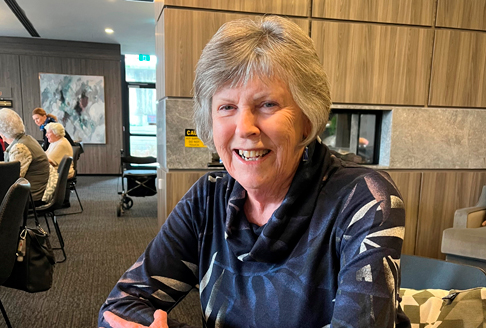
Faces of Baptcare | Meet Marion Cummins from Baptcare’s The Orchards community
Marion is a much-loved member of The Orchards Retirement Living community, both by staff and fellow residents. “Marion is a gentle soul who always asks how we are and is genuinely interested in the answer,” comments Hannah Horsley, Retirement Living Manager at The Orchards.
- 29 Aug 2023
